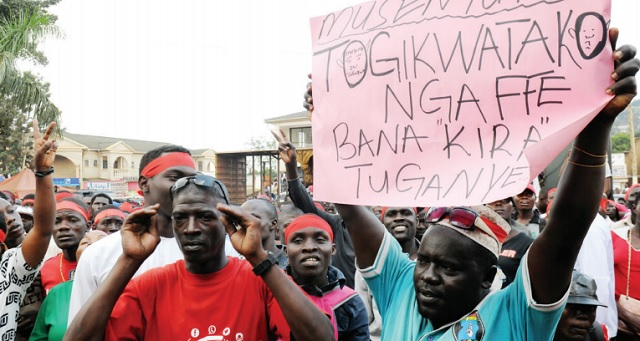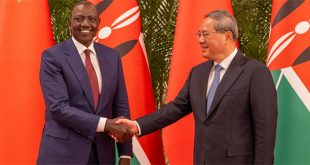
Kampala, Uganda | FLAVIA NASSAKA | Retired Supreme Court Justice George William Kanyeihamba has a direct question for MPs seeking to amend the constitution so that President Yoweri Museveni can stay on.
“Do you want to say that the movement (ruling party – NRM) hasn’t groomed anyone capable of replacing Museveni?”
The professor of law was on Nov. 14 giving his views to the Legal and Parliamentary Affairs Committee of parliament that consulting key individuals regarding the constitutional amendment Bill seeking to lift the presidential age limit from the current 35 to 75 years provision.
“Isn’t it high time you decided that it’s time for the president to retire so he can enjoy peacefully the benefits of retirement?”
Kanyeihamba decried what he termed as ‘attacks’ by the President on MPs who are against the Bill saying it’s a major setback for democracy in the country.
Kanyeihamba, and others like him, are people who are described as `committed democrats” in the latest Afrobarometer survey released on Nov.16. They demand democracy over any other system and consistently reject one-man, military, and one-party rule. Unfortunately, their number appears not to grow in proportion to their public agitation. Instead, according to the Afrobarometer survey results, the Kanyeihambas appear to be fairly agitated after every round of elections but cool off as time drags by.
“We see Ugandans who prefer democracy increasing before elections and decreasing after elections,” says Francis Kibirige, who was among the researchers who conducted the Afrobarometer Round 7 survey on “Support for democracy in Uganda”.
If it is a consolation to the committed democrats, however, the survey results show that satisfaction with the way democracy works in Uganda is steadily decreasing. That means people who feel Uganda is a full democracy, a democracy with minor problems and are fairly/very satisfied with democracy in the country are reducing. It was 62% in 2000 and has reduced to 46% in 2017. That is an average one percentage rise in dissatisfaction per year, which a committed democrat like Kanyeihamba might find unsatisfactory. In fact, the number of unsatisfied Ugandans went below the 50% mark just before the 2016 elections in 2015. Unfortunately for the opposition, the people who were fired up to demand for more democracy at the time were a miserly 64%, the second lowest since 2000. It only shot up to a whopping 81% in 2017; the highest of all time, when the ballot was already cast.
Kibirige says he sees this all the time.
“Demand for democracy in Uganda appears to fluctuate,” he says.
A possible reason for the spike in demand for democracy in 2017 is what many analysts have said; that the recent attack on parliament and the constant clampdown of those with dissenting views is a starkest example of a worrying trend – that many citizens feel their views no longer matter and are therefore losing confidence in the democracy.
The researchers sampled 1200 adult citizens randomly selected from five regions who were interviewed face to face in a period between December 26, 2016 and January 08, 2017.
According to Kibirige, to establish the extent of democracy, respondents were asked how much of a democracy they think the country is requiring them to choose: whether it’s a full democracy or a democracy with minor problems. On popular satisfaction, they were asked whether they are fairly or very satisfied with the way democracy works and to measure demand, respondents were given three statements to choose which one was closest to their opinion – ‘Democracy is preferable to any other kind of government’, ‘in some circumstances, a non – democratic government can be preferable’ and ‘for someone like me, it doesn’t matter what kind of government we have’.
 The Independent Uganda: You get the Truth we Pay the Price
The Independent Uganda: You get the Truth we Pay the Price



